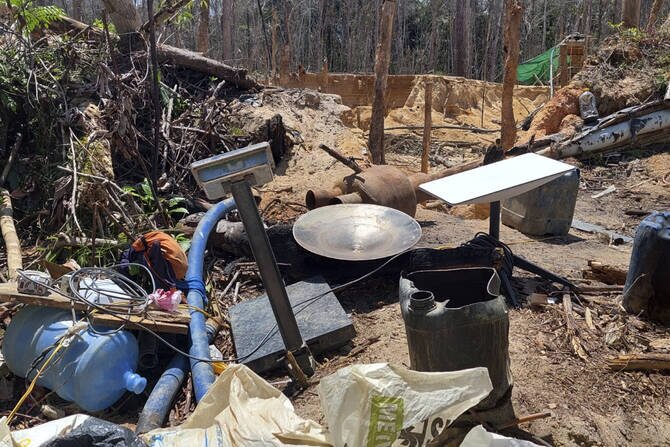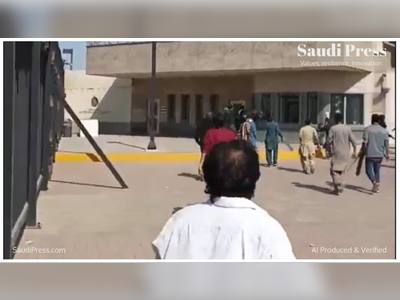
Brazil Strikes Deal with Musk’s Starlink to Curb Criminal Use in the Amazon Rainforest
Brazil's Federal Prosecutor's Office has reached an agreement with Elon Musk's Starlink to curb the use of its services in criminal activities within the Amazon region.
BRASILIA: Brazil’s Federal Prosecutor’s Office announced Friday a deal with Elon Musk’s Starlink to curb the use of its services in criminal activities such as mining in the Amazon rainforest.
The agreement, aimed at combating the adoption of Starlink services by criminal organizations, marks the first of its kind and follows years of pressure from Brazilian authorities.Starlink's high-speed Internet system has rapidly expanded across the Amazon region, which for decades faced connectivity challenges.
However, this advancement has also enabled criminal groups to coordinate logistics, make payments, and receive alerts about police raids due to the reliable communication it provides.Under the terms of the agreement, Starlink will begin requiring identification and proof of residence from all new users in Brazil's Amazon region starting in January.
Additionally, the company will provide Brazilian authorities with user registration and geolocation data for Internet units located within areas under investigation by law enforcement.
In cases where terminals are confirmed to be used for illicit activities, Starlink has committed to blocking the service.This two-year deal can be renewed, representing a significant step towards curbing the criminal use of satellite internet in remote regions.
The Amazon rainforest, home to numerous Indigenous tribes and vital ecosystems, has faced severe environmental degradation due to rampant mining and logging activities.
The adoption of Starlink by criminal groups has exacerbated these issues, as it allows for more efficient management and coordination of illicit operations.Federal prosecutor André Porreca emphasized that the use of satellite Internet in such contexts demands a proportional legal response, ensuring both effective law enforcement measures and respect for indigenous rights and environmental protections.
By addressing the connectivity aspect of these crimes, authorities hope to enhance their efforts to combat criminal activities while safeguarding vulnerable communities within the Amazon.The agreement marks an important shift towards leveraging technology as part of the solution rather than solely a facilitator of criminal operations.
While previous methods of communication among criminals primarily relied on radio signals, Starlink’s capabilities have significantly enhanced their ability to evade law enforcement by providing real-time intelligence about enforcement activities.
This new challenge for authorities underscores the necessity of implementing tighter controls over the sale and usage of such advanced technologies.Jair Schmitt, head of environmental protection at Brazil's environmental agency, highlighted the need for comprehensive regulation to mitigate these risks effectively.
Despite the significance of this deal, concerns remain regarding broader regulatory frameworks that must be established to address the wider implications of emerging technologies on crime and societal well-being.
The agreement, aimed at combating the adoption of Starlink services by criminal organizations, marks the first of its kind and follows years of pressure from Brazilian authorities.Starlink's high-speed Internet system has rapidly expanded across the Amazon region, which for decades faced connectivity challenges.
However, this advancement has also enabled criminal groups to coordinate logistics, make payments, and receive alerts about police raids due to the reliable communication it provides.Under the terms of the agreement, Starlink will begin requiring identification and proof of residence from all new users in Brazil's Amazon region starting in January.
Additionally, the company will provide Brazilian authorities with user registration and geolocation data for Internet units located within areas under investigation by law enforcement.
In cases where terminals are confirmed to be used for illicit activities, Starlink has committed to blocking the service.This two-year deal can be renewed, representing a significant step towards curbing the criminal use of satellite internet in remote regions.
The Amazon rainforest, home to numerous Indigenous tribes and vital ecosystems, has faced severe environmental degradation due to rampant mining and logging activities.
The adoption of Starlink by criminal groups has exacerbated these issues, as it allows for more efficient management and coordination of illicit operations.Federal prosecutor André Porreca emphasized that the use of satellite Internet in such contexts demands a proportional legal response, ensuring both effective law enforcement measures and respect for indigenous rights and environmental protections.
By addressing the connectivity aspect of these crimes, authorities hope to enhance their efforts to combat criminal activities while safeguarding vulnerable communities within the Amazon.The agreement marks an important shift towards leveraging technology as part of the solution rather than solely a facilitator of criminal operations.
While previous methods of communication among criminals primarily relied on radio signals, Starlink’s capabilities have significantly enhanced their ability to evade law enforcement by providing real-time intelligence about enforcement activities.
This new challenge for authorities underscores the necessity of implementing tighter controls over the sale and usage of such advanced technologies.Jair Schmitt, head of environmental protection at Brazil's environmental agency, highlighted the need for comprehensive regulation to mitigate these risks effectively.
Despite the significance of this deal, concerns remain regarding broader regulatory frameworks that must be established to address the wider implications of emerging technologies on crime and societal well-being.











